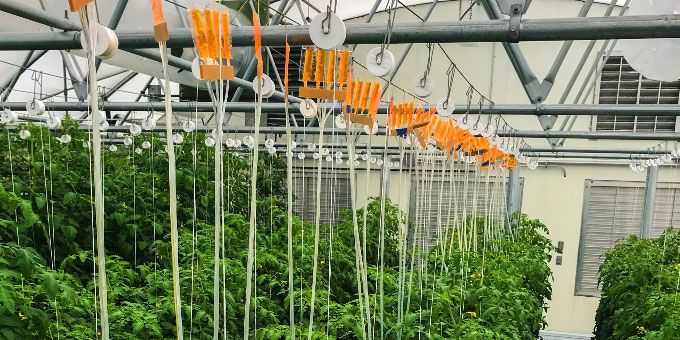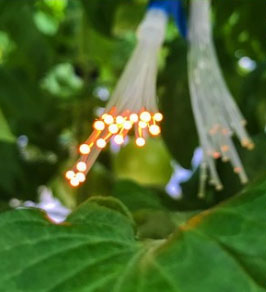Hung above plants in a greenhouse, the fiber concentrator devices absorb underutilized portions of sunlight, convert the energy into a more ideal spectrum, and then strategically guide that light to the lower leaves of plants.
 Novel Quantum Dot Optical Fiber Technology That Delivers Extra Light to the Lower Canopy of Plants
Novel Quantum Dot Optical Fiber Technology That Delivers Extra Light to the Lower Canopy of Plants

News From | UbiQD, Inc.
UbiQD, Inc., a New Mexico-based nanotechnology development company, announced today an optical fiber-coupled luminescent concentrator technology that provides a new tool for optimizing light in controlled environments, enabling light-guiding to future UbiGro™ spectrum-control greenhouse products.

As recently highlighted in a paper published in the peer-reviewed journal, ACS Nano, the novel technology also offers other use cases, including significant impacts on speed and bandwidth of free-space telecommunication systems, and cancer diagnostics.
"We continue to push the envelope with light optimization in greenhouses," said Dr. Hunter McDaniel, CEO of UbiQD. "One exciting potential use case is in vertical farming, where you could use our quantum dot-based luminescent fibers to harvest sunlight and optimally transmit that energy to multiple layers of plants, reducing or perhaps eliminating the need for expensive artificial lighting. It might also be useful in a lunar greenhouse." In 2018 the company was awarded a contract by NASAto develop films for tailoring the spectrum of sunlight on long-duration space missions.
Hung above plants in a greenhouse, the fiber concentrator devices absorb underutilized portions of sunlight, convert the energy into a more ideal spectrum, and then strategically guide that light to the lower leaves of plants that typically receive less natural light due to shading. In one plant trial this methodology boosted the tomato yield in a commercial hydroponic greenhouse by 7% (fresh weight).
By utilizing UbiQD's range of quantum dot colors, covering visible-to-NIR spectral regions, the company also demonstrated a low-cost, miniature broadband medical light source. Integrated into a spectral tissue sensing system, this could enable a real-time cancer test. Additionally, the device can operate as a free space (unfocused) detector in telecommunications or remote sensing, such as LIDAR, for discerning low-power signals.
About UbiQD
UbiQD is a nanotechnology company based in Los Alamos, New Mexico that manufactures safe, high-performance, quantum dots and greenhouse materials. Licensing technology developed at Los Alamos National Laboratory, Massachusetts Institute of Technology, the University of Washington, and Western Washington University, UbiQD envisions a future where quantum dots are ubiquitous in a wide spectrum of applications.
The content & opinions in this article are the author’s and do not necessarily represent the views of AgriTechTomorrow
Comments (0)
This post does not have any comments. Be the first to leave a comment below.
Featured Product

